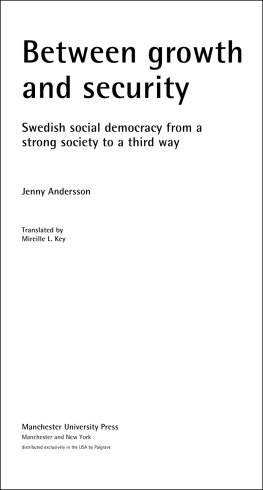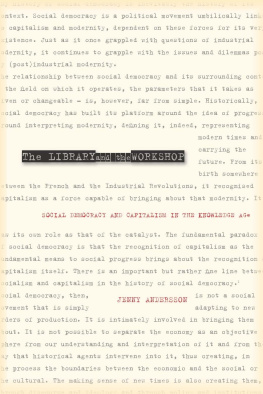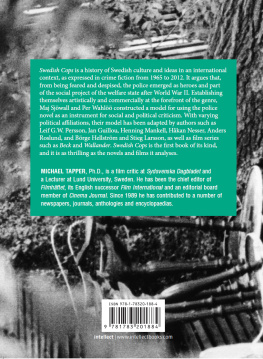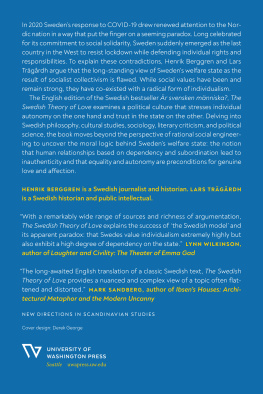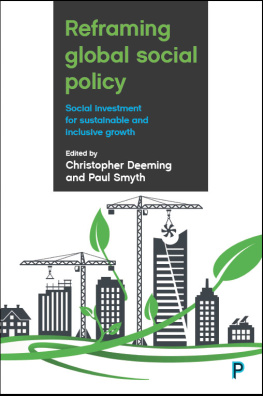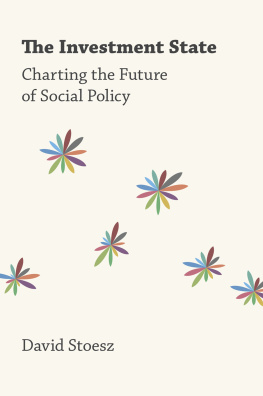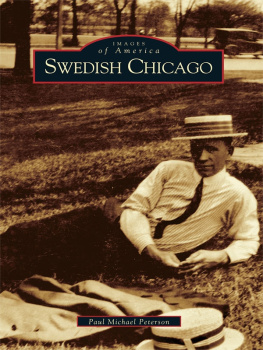Between growth and security
Critical Labour Movement Studies
Series editors
John Callaghan
Steven Fielding
Steve Ludlam
Already published in the series
John Callaghan, Steven Fielding and Steve Ludlam (eds), Interpreting the Labour Party: approaches to Labour politics and history
Dianne Hayter, Fightback! Labours traditional right in the 1970s and 1980s
Jonas Hinnfors, Reinterpreting social democracy: a history of stability in the British Labour Party and Swedish Social Democratic Party
Jeremy Nuttall, Psychological socialism: the Labour Party and qualities of mind and character, 1931 to the present
Declan McHugh, Labour in the city: the development of the Labour Party in Manchester, 191831
Between growth and security
Swedish social democracy from a strong society to a third way
Jenny Andersson
Translated by Mireille L. Key
Copyright Jenny Andersson 2006
The right of Jenny Andersson to be identified as the author of this work has been asserted by her in accordance with the Copyright, Designs and Patents Act 1988.
Published by Manchester University Press
Oxford Road, Manchester M13 9NR, UK
and Room 400, 175 Fifth Avenue, New York, NY 10010, USA
www.manchesteruniversitypress.co.uk
Distributed exclusively in the USA by
Palgrave, 175 Fifth Avenue, New York,
NY 10010, USA
Distributed exclusively in Canada by
UBC Press, University of British Columbia, 2029 West Mall,
Vancouver, BC, Canada V6T 1Z2
British Library Cataloguing-in-Publication Data
A catalogue record for this book is available from the British Library
Library of Congress Cataloging-in-Publication Data applied for
ISBN 978 0 7190 7439 1
First published 2006
15 14 13 12 11 10 09 08 07 06 10 9 8 7 6 5 4 3 2 1
Typeset
by Action Publishing Technology Ltd, Gloucester
Printed and bound in Great Britain
by Cromwell Press, Trowbridge, Wiltshire
Series editors foreword
The start of the twenty-first century is superficially an inauspicious time to study labour movements. Political parties once associated with the working class have seemingly embraced capitalism. The trade unions with which these parties were once linked have suffered near-fatal reverses. The industrial proletariat looks both divided and in rapid decline. The development of multi-level governance, prompted by globalisation has furthermore apparently destroyed the institutional context for advancing the labour interest. Many consequently now look on terms such as working class, socialism and the labour movement as politically and historically redundant.
The purpose of this series is to give a platform to those students of labour movements who challenge, or develop, established ways of thinking and so demonstrate the continued vitality of the subject and the work of those interested in it. For despite appearances, many social democratic parties remain important competitors for national office and proffer distinctive programmes. Unions still impede the free flow of market forces. If workers are a more diverse body and have exchanged blue collars for white, insecurity remains an everyday problem. The new institutional and global context is moreover as much of an opportunity as a threat. Yet, it cannot be doubted that compared with the immediate post-1945 period, at the beginning of the new millennium, what many still refer to as the labour movement is much less influential. Whether this should be considered a time of retreat or reconfiguration is unclear and a question the series aims to clarify
The series will not only give a voice to studies of particular national bodies but will also promote comparative works that contrast experiences across time and geography. This entails taking due account of the political, economic and cultural settings in which labour movements have operated. In particular this involves taking the past seriously as a way of understanding the present as well as utilising sympathetic approaches drawn from sociology, economics and elsewhere.
John Callaghan
Steven Fielding
Steve Ludlam
Acknowledgements
This book was first published in Swedish as the result of a doctoral thesis, and I want to thank all those who have read and commented on the Swedish publication in the two years following its publication. I am grateful to three reviewers in Sweden, Bo Strth, Urban Lundberg and Ann-Marie Lindgren, as well as two anonymous reviewers at Manchester University Press. Thanks to a long row of social democrats and policymakers in Sweden who have met and talked to me. I am especially grateful to Ingvar Carlsson and Rudolf Meidner for interviews. My academic supervisor Lena Sommestad has been a major influence on this book. I also want to extend a thank you to the students who have read the Swedish book as part of their studies and who have been a great source of inspiration in the process of rewriting it in English. Thanks, as always, to all in the Department of Economic History at Uppsala University, as well as to a long row of people in the Institute for Futures Studies and the Institute for Contemporary History in Stockholm, the FOSAM (Forum for contemporary history) in Oslo, the European University Institute in Florence, and the conference network Rethinking Social Democracy. Thanks to all at Manchester University Press, and a final, heartfelt, thank you to my translator Mireille Key, who did a wonderful job at turning my PhD-prose Swedish into more fluent English. In my final rewriting and editing I have mishandled her translation, and I thank her also for forgiving me for this.
I want to dedicate this book to my grandfathers, Hans Olsson and Tage Andersson; one with a certain amount of scepticism for Social Democracy and the institutions of the peoples home, the other with a blind faith in the party.
Introduction
Social policy is not a cost but a productive investment, wrote the Swedish social democratic economist Gunnar Myrdal in 1932, the year the Swedish Social Democratic party (SAP) gained electoral power. This idea of social policy as a productive investment became a core feature in the ideology of Swedish Social Democracy and a central component in the discursive foundation of the Swedish welfare state. The expansion of public responsibility for social security that took place in the post-war period was based on the notion of security and social citizenship as the foundation for an efficient society, and indeed as a prerequisite for future economic growth. However, as the SAP embarked on its third way in the late 1970s and early 1980s, its understanding of social policy as a productive investment seemed to have been replaced by the identification of social policy as a cost and a drain on resources.
The book is about this ideological turnaround and how the notion of the productive role of social policy has changed in the SAPs economic and social policy discourse in the post-war period, from its ideology of the strong society in the 1950s and 1960s, to the attempts to articulate an ideology around the notion of a third way in the early 1980s. The analysis focuses on the two key ideological concepts security (

